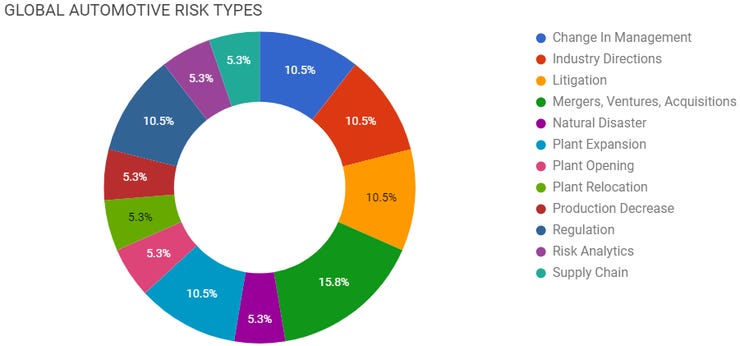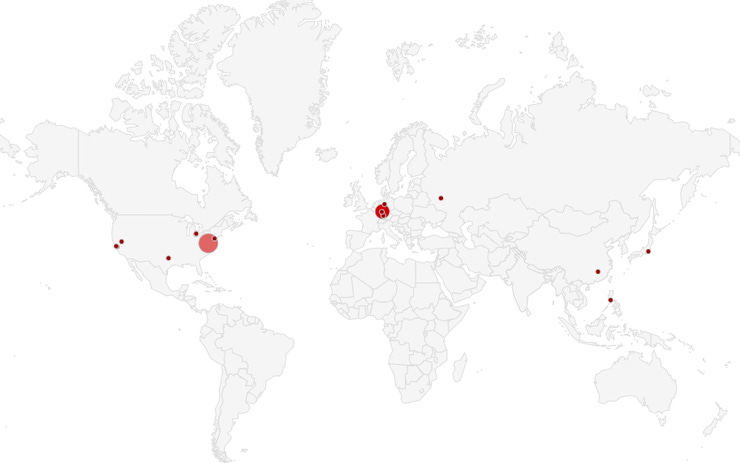Elm Analytics - Automotive Supply Chain Risk Digest #85 - September 21 - 27, 2018
CHANGE IN MANAGEMENT
Daimler has announced that Ola Kallenius will succeed Dieter Zetsche as its new CEO starting next year. Kallenius previously held leading roles at McLaren Automotive and Mercedes' AMG performance division.
INDUSTRY DIRECTIONS
McKinsey released a report on the future of the commercial vehicle industry for IAA Commercial Vehicles 2018.
Philippine inventor Kyxz Mendiola unveiled his flying passenger drone, the Koncepto Milenya, to a cheering crowd as he took it on its first test flight. The drone can fly as high as 20 feet and travel as fast as 37 mph.
LITIGATION
The SEC is suing Tesla CEO Elon Musk, accusing him of making false public statements with the potential to hurt investors. The lawsuit seeks to bar him from serving as an executive or director of any publicly traded company.
Uber has agreed to a $148m settlement over claims related to a large-scale 2016 data breach that exposed the personal info of more than 25 million of its U.S. users. The payout is thus far the biggest in data-breach history.
MERGERS, VENTURES, ACQUISITIONS
Thyssenkrupp is giving in to years of investor pressure and splitting into two companies. The company's supervisory board is due to sign off on the plans on Sep. 30.
Ford is reportedly in talks with Volkswagen and Mahindra about expanding product and technology alliances. Ford executives say it is a key part of the automaker's plan to cut costs.
China's EV startup, Byton, signed a cooperation agreement with Bosch to work in powertrain, brake and driver assistance systems.
NATURAL DISASTER
Mazda is reporting that they lost 44,000 vehicles in Japan due to torrential rains over the summer. The automaker says it is a loss of about $249.3m.
PLANT EXPANSION
Kirchoff Automotive is expanding and relocating its Garland, Texas plant from 94,000 to 115,000sf. As part of the expansion, the supplier will also invest more than $20m into new advanced machinery and equipment at the facility.
Panasonic is helping Tesla get out of "production hell" by adding three new battery production lines at its gigafactory in Nevada. The supplier had planned to have the lines operational by the end of the year and now says that they will complete the plan ahead of schedule.
PLANT OPENING
Chinese automaker Great Wall Motor is opening a new assembly plant in Russia in the first half of 2019. The plant can build up to 150,000 vehicles per year and will initially produce Haval-badged crossovers and SUVs.
PLANT RELOCATION
GM has announced that Cadillac will move its HQ back to Detroit from New York City. They say that "The move will place the Cadillac brand team closer to... design, engineering, purchasing and manufacturing, ensuring full integration of Cadillac's global growth strategy."
PRODUCTION DECREASE
Opel is scaling back production at its Russelsheim, Germany plant from 42 to 35 vehicles per hour. The automaker lowered output to 42 vehicles per hour only last month.
REGULATION
U.S. Trade Rep. Robert Lighthizer says that the U.S. will move forward on a bilateral trade deal with Mexico even is Canada is left out. He says that negotiators can't resolve differences over dairy and a dispute resolution system, but also said that they would try to reach a "...separate deal as soon afterwards as we can." with Canada.
The Department of Commerce underestimated the number of requests for tariff exclusions. The current estimate would take 50 people working full time for two years to process the current backlog. Sen. Ron Wyden: "When you have suppliers still waiting on an answer, you pour gasoline on the fire of uncertainty"
RISK ANALYTICS
A new study from the Center of Automotive Research suggests that President Trump's proposed 25% tariffs on imported vehicles and parts would result in the loss of 715,000 American jobs and a reduction of $60b in economic output.
SUPPLY CHAIN
Chinese lithium supplier Ganfeng Lithium says it has reached a deal to supply a fifth of its production to Tesla for its EVs. The agreement is set to run through 2020 and could be extended by three years.







